Enceladus (satellite) another wonder of the universe
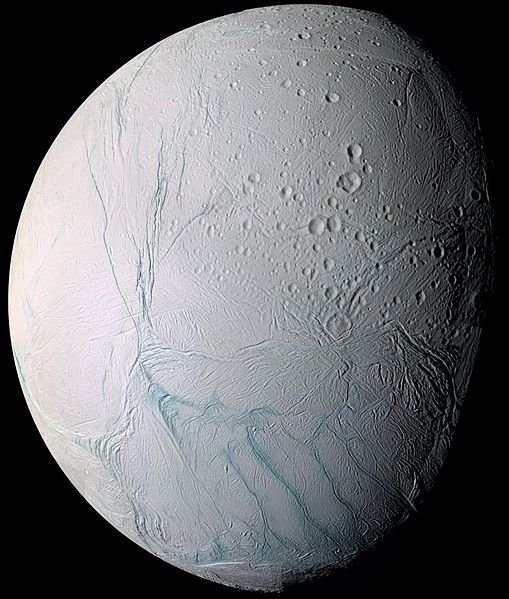
Mosaic of twenty-one images of the south pole of Enceladus taken by the Cassini spacecraft on July 14, 2005. Craterized lands are seen on the upper right and below the so-called tiger stripes where the geysers originate. Enceladus is one of the most active objects in the solar system, source of domain image of Wikimedia Commons, Author: NASA/JPL/Space Science Institute
There Exists between the men the widespread habit of observing the sky as: the Sun, the Moon and the stars, this way has done to itself from first time of the history, since often with the unknown on the origin of all this multitude of stars, which can be contemplated in the starred nights. From those remote origins, the restored ones that have happened to the mystery of the universe they have been numerous, until the XVIth century, they did not have a scientific character, based on the experimentation, from then the astronomical theories, they have been alone surer and surer and trustworthy, already in the XXth century, the universe stopped being definitively a mystery, to turn into a constant object of analysis and of study.
Thanks to The big one of sir William Herschel discovered, at the end of the XVIIth century, a multitude of small clouds of diverse forms, which named nebulas, years happened without he was going so far as to know nothing concrete about these nebulas, until the American astronomer Edwin Hubble observed in 1924, that it was composed the nebulas of Andrómeda for innumerable stars, was then when the concept of galaxy was established. With the name of solar system a unit, small letter is known in the frame of the universe, but of big dimensions for ours human proportions, which is formed by quite a celestial aserie of bodies, which turn about one stars and the Sun.
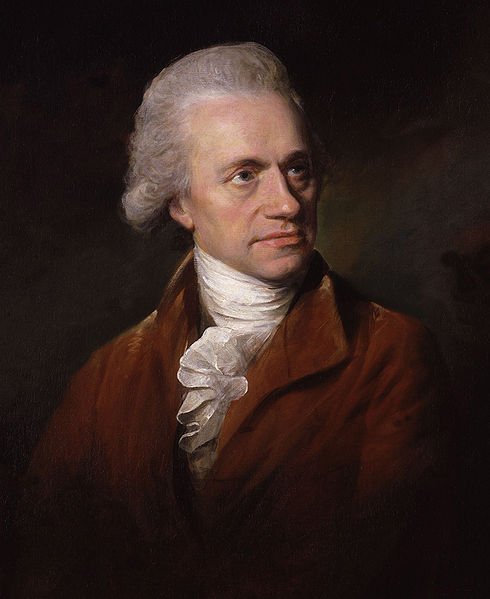
William Herschel(1738-1822), Encélado was discovered by William Herschel on August 28, 1789 with his new telescope of 1,2 m, then the biggest of the world, the satellite gets his name for the giant Encélado of the Greek mythology, the name was proposed by John Herschel in his publication of 1847 of the results of his astronomical remarks in the end of Good Hope. Also Saturn names him a, source II of image of mastery of Wikimedia Commons.
To reference of the planets we have, that are celestial solid bodies of spherical form, lacking in proper light, which turns about stars and the Sun, good now well we are interested in the planet Saturn, it is the sixth solar planet and also a star of big size, it is most flattened of all the planets and his thickness is the minor of all the system, his composition both in the nucleus, and in the ambience, it is very similar to that of Júpiter, one believes that it has a nucleus of rock and ice surrounded with a layer of metallic hydrogen and an external, cloak also with hydrogen, which finishes turned into the gaseous ambience. Saturn differs to simple sight in the presence of a system of ring, which surrounds it at a height of the equator, these very smoothed rings, which has one km from thickness, spreads up to a distance of 137000 km, it is formed by very thin dust and a big number of fragmented of ice.
Saturn possesses at present 62 satellites with confirmed orbits, all with different forms, surfaces and origins although one believes that the majority were captured on having entered to the gravitational field of this planet, of which some of them are considered lunas as the case of Titán it is the most important of all the saturnine lunas, but with the time there exists other that has evolved internally doing more fascinating, Encélado is the sixth biggest satellite of Saturn, with approximately 500 km from diameter, approximately the tenth part of that of Titán, the biggest satellite saturniano. It is covered by a layer of recent and clean ice that reflects almost the whole solar light that affects on him, from what the superficial temperature only reaches-198 ℃ to midday, in spite of his small size, has a wide variety of superficial features that go from regions ancient and characterized to young areas and deformed tectónicamente that 100 formed scarcely millions of years ago.
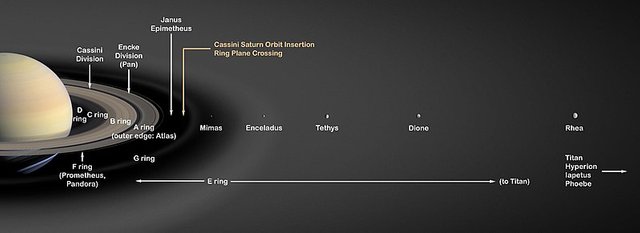
Side sight of the orbit of Encélado, showing it as regards the ring E of Saturn, source of image of mastery of Wikimedia Commons, image source: http://photojournal.jpl.nasa.gov/catalog/PIA03550
Was discovered by it on August 28, 1789 by William Herschel, but very little of him was known until the probes Voyager happened much close at the beginning of the decade of 1980. In 2005, the probe Cassini began a series of sobrevuelo that revealed major details, in particular, it discovered tufts rich in water in the south pole, the criovolcanes near to the south pole were expelling to the space in the shape of geysers, jets of water steam, other volatile substances and solid material that was including glazing of sódico chloride and particles of ice, which with valuations of expulsion of up to two hundred kilograms per second. More than hundred geysers have been identified, part of the water steam falls down again in the shape of snow; the rest escapes and gives most of the material that constitutes the ring E, according to scientists of the BREAD BIN, the composition of the tufts is similar to that of the comets, in 2014, the BREAD BIN reported that he had found tests of the presence of a big subsuperficial ocean of water in the south pole of approximately ten kilometers of thickness.
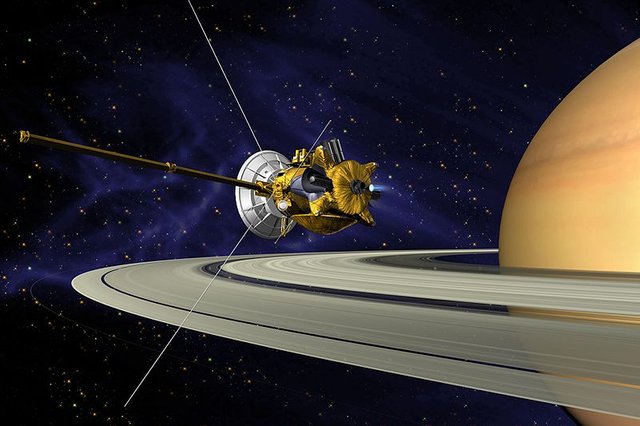
Artistic Concepcion of the probe Cassini in his maneuver of insertion in orbit about Saturn, source of image of mastery of Wikimedia Commons, Author: NASA/JPL
As the planets, the satellites are celestial solid bodies and they lack proper light and his only peculiarity consists in that orbit about a planet, considering that instead of doing it environment to a star for saying it about this form. The dimensions of these bodies celestial, as well as the eccentricity of his orbits, are very varied, there have been discovered more than 61 satellites, which orbital in different number about all the planet of system solar, except Mercury and Venus that they lack them.
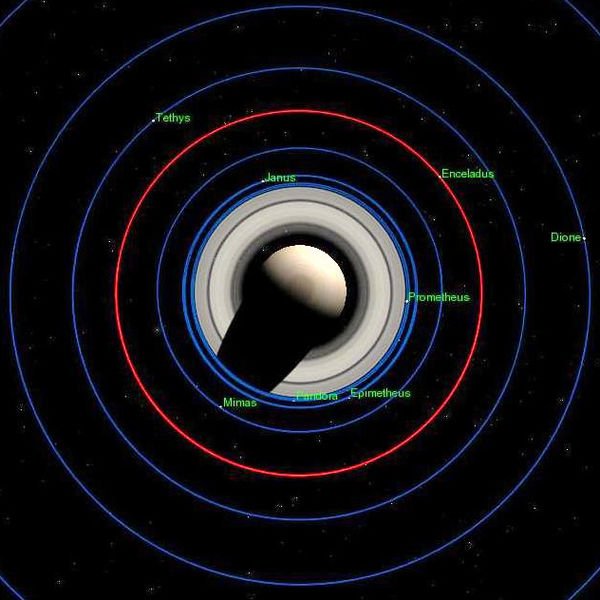
Sight of the orbit of Encélado (highlighted in red) from the North Pole of Saturn, source of image of mastery of Wikimedia Commons, Author: The original uploader was The Singing Badger at English Wikipedia.
what it does you fascinated of the Encélado (satellite) as another marvel of the universe, it is on his part of the water steam it falls down again in the shape of snow, since the water is the one that can cause life primitive as the bacteria, since it happened in our planet earth, just think if the Encélado, it keeps on evolving to causing life, yes the fact is that it already has it, but we it do not know only the time and the technology they will say it. All this information we owe her to him to the probe Cassini, in his maneuver of insertion in orbit about Saturn.
Cassini-Huygens was a joint project of the BREAD BIN, THAT ONE and LIKE THAT, it was a question of a spatial not crewed mission which target was to study the planet Saturn and his natural satellites, coloquialmente called lunas, the spaceship was consisting of two principal elements: the probe Cassini and the module of descent Huygens, where the throwing took place on October 15, 1997 of the station of End Cane plantation with a rocket Titan IVB/Centaur of two stages and entered orbit about Saturn on July 1, 2004, December 25, 2004 the probe separated from the ship approximately to 02:00 UTC. The probe reached the biggest moon of Saturn, Titán, on January 14, 2005, moment in the one that descended to his surface to gather scientific information, it was a question of the first ship that there was orbiting Saturn and the fourth spatial human appliance that was visiting it, his name owes to itself the astronomers Giovanni Cassini y Christiaan Huygens, before it was disappearing in September, 2017, after 20 years of being in the space, this mission sent records that prove to be what is the composition of the rings of this planet, also it indicates us that the most internal ring of Saturn, called D, is throwing grains of dust to the top ambience (ionosphere) of the planet and doing it at an extraordinary speed simultaneously that turns, so much as 10.000 kilos of material per second.
Hope that another marvel of the universe, it tells us his history, like part of galaxy.
Bibliography
Chronicles of the System Solarpor Francisco Anguita Virella, Gabriel Castile Cañamero - 2010.
Astrobiología: A bridge between Big Bang and the life - Page 264 for Bartolo Luque, Fernando Archers, Álvaro Márquez - 2009.
Secrets of the universe - Page 336 for Paul Murdin - 2009.
Saturn (planet)wikipedia.
Enceladus (satellite)wikipedia.

flagged for plagiarism @steemflagrewards
Google translatation of the first paragraph of https://es.wikipedia.org/wiki/Enc%C3%A9lado_(sat%C3%A9lite)
But now I know that NASA means BREAD BIN in Spanish, so thanks
Steem Flag Rewards mention comment has been approved! Thank you for reporting this abuse, @mathowl.
You are posting content that is not yours by copying it without sourcing or manipulating it to pass plagiarism tools.
This post was submitted via our Discord Community channel. Check us out on the following link!
SFR Discord
Follow on flag for plagiarism @steemflagrewards.
Follow on flag for plagiarism @steemflagrewards
Good evening, I already communicate in the channel
@steemflagrewards explain my case and my mistake I just wait for the decision of them
Congratulations @clawfinger! You have completed the following achievement on the Steem blockchain and have been rewarded with new badge(s) :
Click here to view your Board of Honor
If you no longer want to receive notifications, reply to this comment with the word
STOP